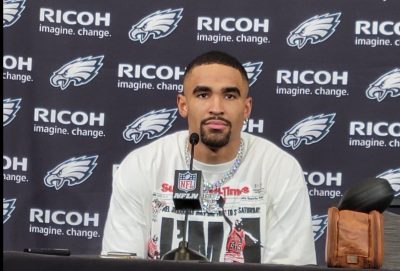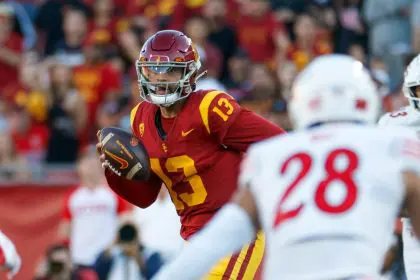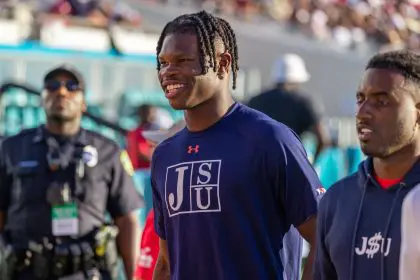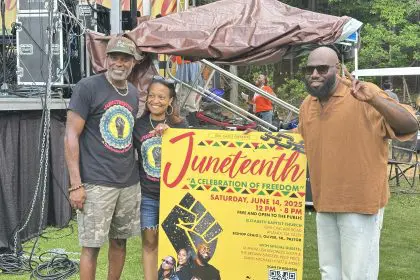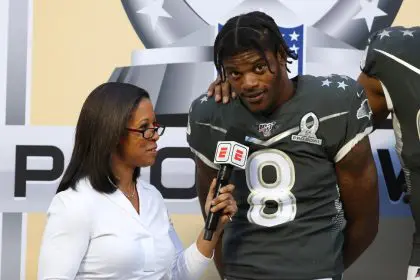
Former Green Bay Packers star running back and Super Bowl champion Dorsey Levens is no stranger to the ups and downs of being a professional athlete. A fifth-round draft pick and former star college athlete at Georgia Tech, he set a school record by averaging 7.2 yards per carry. In his senior year, he rushed for 823 yards and scored eight touchdowns in that season. While playing for the Packers, he twice rushed for 1,000 yards or more and was selected for the Pro Bowl.
Now, the Syracuse, N.Y., native has retired from football and has found his place as an NFL analyst and owner of Levens Communications, a company specializing in all things entertainment, except for music. His latest endeavor is the play, Stripped, starring himself, Lisa Wu Hartwell of “Real Housewives of Atlanta”; former Atlanta radio personality Rashan Ali; and Ryan Stewart of 2 Live Stews.
Stripped will begin its run on July 27-31, 2011, at Georgia Tech’s Ferst Center. I had the opportunity recently to catch up with the busy playwright and actor to talk about his new ventures, retirement and the NFL. –christa e. jackson
Tell me about your new play, Stripped, and how you came up with the storyline?
Tiffany Brown from A Higher Calling theater company wrote it with me. She wrote another play called Torn that we did last year, and it was a great play. We had a great time. This time around, things are going to be a little bit different. We are trying to change the face of stage plays. This is not your typical stage play. It’s not your typical topic or issue. This one adds elements of videos.
It is a story about Jayden Dorcey, a newly retired pro athlete who is going through it. He is about to lose his money, his wife, his best friend… Everything hits the fan at his best friend’s funeral. Our plays start at the end and, then, we backtrack and tell you what happened. This is a story you hear time and time again — about pro athletes and their money problems — and, for whatever reason, we just haven’t figured it out yet.
So, there’s a connection between Stripped and real life in the NFL. Talk a little about that.
We don’t know how to save money. We spend it recklessly. One of my goals was to try and do a training camp tour, and my intentions also are to mentor younger players to try to help them avoid some of the pitfalls that most of us go through. With that being said, we also give you our perspective. It’s not the media perspective or somebody who has never played the game. It’s so unique because people just don’t get it. They think because you are a pro athlete and you make millions of dollars, life is good … everything is perfect.
If you have never been in this situation, you will never understand it. It sounds like the ultimate paradox, you know, like how are you going to give me more money, and I’m going to have more problems. I’m not saying that it is all bad, but it’s not all good either. There are a lot of sacrifices that go along with it. What I did was I got four former pro football players-turned-actors, so we all understand the lifestyle.
How do you feel about the NFL guiding and preparing young football players for this lifestyle?
When I was coming up and playing, they didn’t have a rookie symposium… I know the NFL is trying to help these players. How successful they are … I’m not really sure because, at the end of the day, once you leave that auditorium, you have to go and live your life. One thing about the NFL is that it’s not daycare. You know it’s not going to baby-sit you. You are an adult, and they expect you to act like an adult. With that being said, at the end of the day, you have to make your own decisions.
What do pro athletes have to give up to have fortune and fame?
You have to give up your freedom because you can’t go out and do what you want to do and think there is not going to be any consequences. This day and age, I feel bad for these guys because of these cell phones and social media. I didn’t have to deal with all of that. The biggest thing you give up is yourself.
How have you transitioned from the NFL to retirement?
Initially, it was rough just because I wasn’t sure what I wanted to do. I have been a football player my whole life. When I retired, my initial plan was to take a year or two off, relax, kick it and then figure out what I wanted to do. Well, after about six weeks, I was bored out of my mind. Retirement is for old folks, and I just couldn’t do it. I can’t sit still and do nothing. That’s when I started doing broadcasting, and, initially, I sucked because I wasn’t sure that’s what I wanted to do. I didn’t put the right time and effort in it. Then I started taking acting class, which was 10 years ago, and I enjoyed that, and I also enjoyed the behind-the-scenes stuff just as much.
Have the changes that you have seen happen in the NFL been positive ones, in your opinion?
I like the changes because, in the long run, they are better for the guys’ health. One of the biggest parts of my documentary that I’m working on is early Alzheimer’s, and I interview guys, and it’s like … wow. One of the biggest things, obviously, are the benefits for retired players. The NFL culture … we have a warrior mentality. As the saying goes, the NFL stands for “Not For Long,” so you worry about right now. You don’t worry about down the road.

